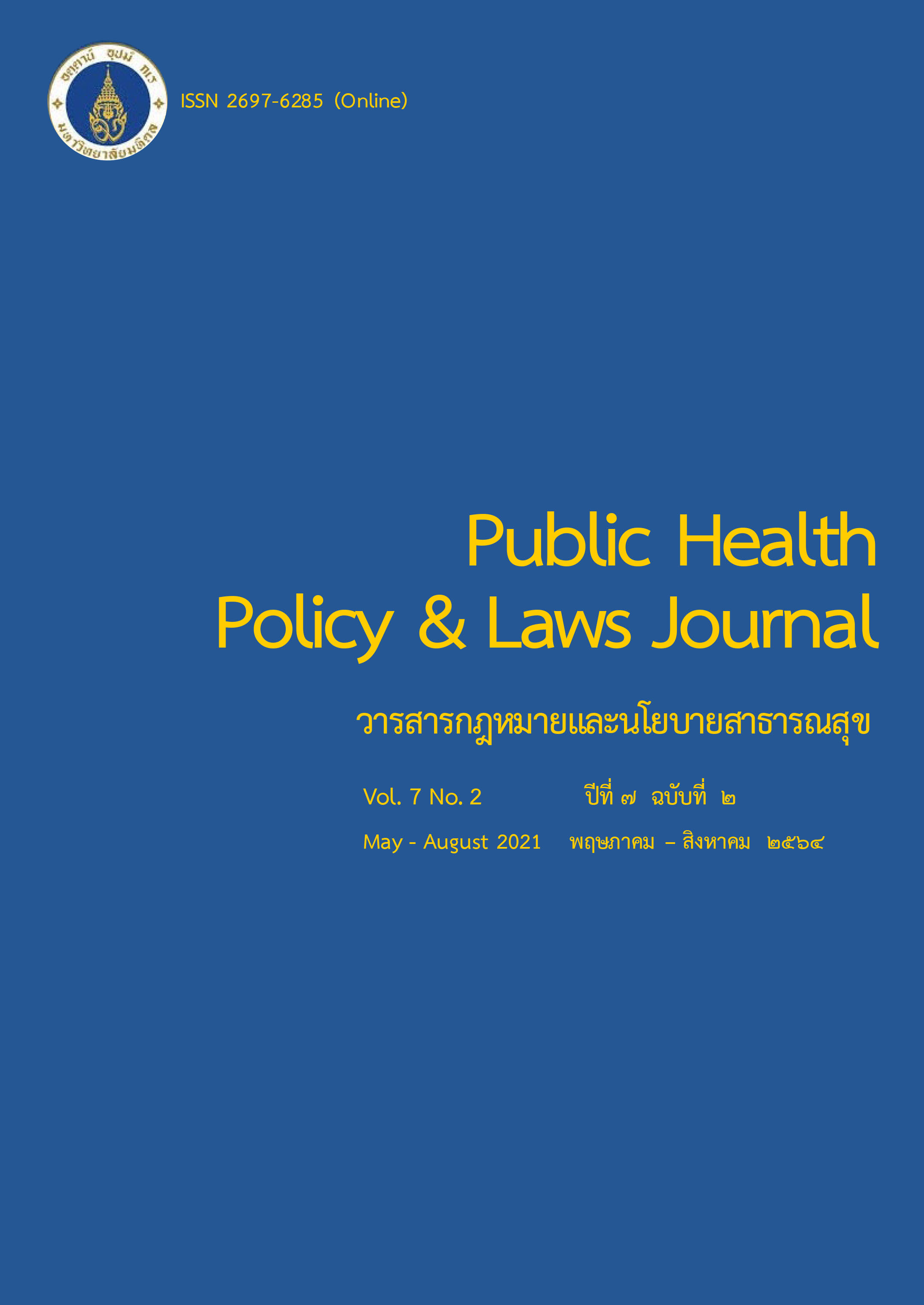Effect of Application of Self-efficacy Theory on Life Skills in Preventing Sexual Risk Behavior of Early Adolescents in Phetchaburi Province
Keywords:
Self-efficacy, Life skills in prevention of risky behavior, Early adolescenceAbstract
This quasi-experimental study aimed to study on the effects of self-efficacy theory application on life skills prevention of early adolescents’ sexual risk behavior, in Phetchaburi province. The sample group consisted of 70 primary school students, grades 5-6, with 35 students from Tan Kong School who received 3 times of the behavior modification program against sexual risk behavior, and the comparison group were 35 students from Tha Yang Prachasan School, who were taught in usual classes. Data were collected from November 2020 to February 2021, analyzed by descriptive statistics: percentage, mean, and standard deviation, Chi-square test, Wilcoxon signed-rank test, and Mann-Whitney U test.
The results of the intra-group comparison after the experiment demonstrated the experimental groups had a significance higher scores on knowledge, attitude, expectation of good results, and life skills in preventing sexual risk behavior, than before the experiment (p <0.001). Self-efficacy results were significantly higher than before the experiment (p = 0.001). For the inter-group results, the experimental group had a significantly higher scores on knowledge, attitude, self-efficacy and the expectation of good results, than the comparison group (p <0.001); and had a significant higher score on life skills to prevent sexual risk behavior than that of the comparison group (p = 0.001).
These results demonstrated that a program with self-efficacy theory applied to life skills had an impact on prevention of sexual risk behavior among early adolescents. Therefore, relevant departments should apply this program in teaching and learning for students in schools, or organize training for developing behavioral skills against sexual risk behavior among adolescents.
References
กรมสุขภาพจิต กระทรวงสาธารณสุข. (2554). คู่มือการสอนทักษะชีวิตในสถานศึกษาระดับมัธยมศึกษาตอนต้น. กรุงเทพฯ: บริษัทยูเรนัส อิมเมจกรุ๊ป จำกัด.
กระทรวงสาธารณสุข.(2560). ยุทธศาสตร์การป้องกันและแก้ไขปัญหาการตั้งครรภ์ในวัยรุ่นระดับชาติพ.ศ.2560-259 ตามพระราชบัญญัติการป้องกันและแก้ไขปัญหาการตั้งครรภ์ในวัยรุ่น พ.ศ.2559. พิมพ์ครั้งที่ 2. กรุงเทพฯ.โรงพิมพ์เทพเพ็ญวานิสย์.
กระทรวงสาธารณสุข.(2560). สถิติการคลอดของแม่วัยรุ่นประเทศไทยปี พ.ศ.2558. พิมพ์ครั้งที่ 1. กรุงเทพฯ. โรงพิมพ์ชุมนุมสหกรณ์การเกษตรแห่งประเทศไทย.
ขวัญชนก เคนสี และสุปาณี สนธิรัตน์. (2563). พฤติกรรมการเลียบแบบ สัมพันธภาพในครอบครัว ทักษะชีวิตกับพฤติกรรมเสี่ยงทางเพศของนักเรียนชั้นประถมศึกษาปีที่ 6 ในเขตหนองจอก กรุงเทพมหานคร. วารสารสังคมศาสตร์และมนุษยศาสตร์, 46 (1), 113-145.
ฐานดา เกียรติเกาะ, นฤมล เอื้อมณีกูล, สุนีย์ และกำปั่น และอาภาพร เผ่าวัฒนา. (2557). ผลของโปรแกรมพัฒนาทักษะกานป้องกันการถูกล่วงละเมิดทางเพศในวัยรุ่นหญิงกลุ่มเสี่ยง. วารสารพยาบาลสาธารณสุข. 28(1) : 55-69.
บุญฤทธิ์ สุขรัตน์.(2557). การตั้งครรภ์ในวยัรุ่น: นโยบายแนวทางการดำเนินงานและติดตามประเมินผล. พิมพ์ครั้งที่ 2. นนทบุรี: กระทรวงสาธารณสุข
บุรเทพ โชคธนานุกูล และกมลชนก ขําสุวรรณ.(2559). “การตั้งครรภ์ในวัยรุ่น”ผลกระทบทางสังคมจากมุมมองเรื่องเพศของแม่ต่างรุ่น. วารสารประชากร. 4(2): 61-79.
ภาสิต ศิริเทศ, กนิษฐา จำรูญสวัสดิ์, ศุภชัย ปิติกุลตัง และกรวรรณ ยอดไม้. (2560). ผลของโปรแกรมพัฒนาทักษะชีวิตต่อการรับรู้ความสามารถของตนเองในการป้องกันการตั้งครรภ์ในวัยรุ่นของนักเรียนหญิงชั้นมัธยมศึกษา จังหวัดพระนครศรีอยุธยา. 47(3): 241-254.
ภาสิต ศิริเทศ, บุญตา กลิ่นมาลี, ธิติพร สุวรรณอำภา และธีทัต ศรีมงคล. (2562). ผลของโปรแกรมป้องกันการตั้งครรภ์ในวัยรุ่นตอนต้นเพื่อตอบสนอง พระราชบัญญัติการป้องกันและแก้ไขปัญหาการตั้งครรภ์ในวัยรุ่น พ.ศ. 2559. วารสารกฎหมายสุขภาพและสาธารณสุข. 5(2): 165-177.
ภาสิต ศิริเทศ. (2562). ผลของโปรแกรมพัฒนาทักษะชีวิตในการป้องกันพฤติกรรมเสี่ยงทางเพศของวัยรุ่นตอนต้น. วารสารวิจัยสาธารณสุขศาสตร์ มหาวิทยาลัยราชภัฎอุบลราชธานี. 8(2): 123-132.
ริษา บุนนาค, ลักขณา เติมศิริกุลชัย, ภรณี วัฒนสมบูรณ์, และอาภาพร เผ่าวัฒนา. (2556). ประสิทธิผลของโปรแกรมทักษะชีวิตในการป้องกันพฤติกรรมเสี่ยงที่นำไปสู่การมีเพศสัมพันธ์ของนักเรียนชั้นมัธยมศึกษาตอนต้น จังหวัดนครปฐม. วารสารสาธารณสุขศาสตร์. 43 (1): 80-93.
วิโรจน์ อารีย์กุล.(2553). การดูแลสุขภาพและการให้คำแนะนำวัยรุ่น (Adolescent Health Care and Supervision). กรุงเทพฯ: รุงศิลป์การพิมพ์
สำนักอนามัยเจริญพันธุ์ กรมอนามัย กระทรวงสาธารณสุข. (2557). การตั้งครรภ์ในวัยรุ่นนโยบายแนวทางการดำเนินและติดตามผลประเมิน.พิมพ์ครั้งที่ 2.นนทบุรี. โรงพิมพ์ชุมนุมสหกรณ์การเกษตรแห่งประเทศไทย.
อภินันท์ วัชเรนทร์วงศ์. (2553). ปัจจัยด้านสังคมกับพฤติกรรมเสี่ยงต่อการมีเพศสัมพันธ์ของนักเรียนมัธยมศึกษาจังหวัดสมุทรสาคร. วิทยานิพนธ์วิทยาศาสตรมหาบัณฑิต สาขาวิชาสุขศึกษาและพฤติกรรมศาสตร์ มหาวิทยาลัยมหิดล.
Downloads
Published
How to Cite
Issue
Section
License
Disclaimer and Copyright Notice
The content and information presented in articles published in the Journal of Law and Public Health Policy represent the opinions and sole responsibility of the respective authors. The editorial board does not necessarily agree with or assume any responsibility for the views expressed.
All articles, data, content, images, and other materials published in the Journal of Law and Public Health Policy are the intellectual property of the journal. Any individual or organization wishing to reproduce, distribute, or otherwise use the entirety or any part of such materials must provide proper citation.





